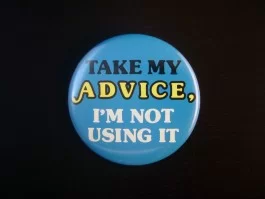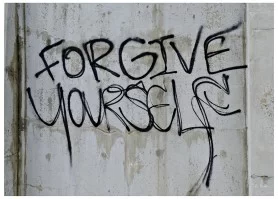Know That Ive Started Smoking Again

by Andrea Blundell
Who hasn't at some point advised a friend or loved one to just 'forgive and forget'?
And yet when it's our turn to be the forgiver, it can be a different story.
Why is it that forgiveness is so much easier said than done?
Do we have to forgive others?
Yes, research shows that forgiveness has a lot of benefits. For example, a study on female survivors of emotionally abusive relationships found that 'forgiveness therapy' led to less anxiety and depression, better decision making, and a greater ability to manage emotions.
But sometimes what we want to forgive really is a big ask.
Difficult things can happen, and in such cases it's best not to be hard on yourself if you can't move on and forgive. There is no rule that we have to forgive everyone. Sometimes the best we can do is work to find acceptance, and seek the help of a professional if that is a struggle.
But other times we can't forgive because we simply have yet to recognise the pattern or the self-deception we are stuck in that is stopping us from letting go.
12 Reasons You Can't Forgive and Forget
See if one of the reasons below is holding you back from forgiving and forgetting for once and for all.
1) You aren't being honest with yourself about the real cause of your hurt.
We can convince ourselves we are mad at someone for one thing, when really we are upset about something entirely different. We won't forgive a sibling for not coming to our party, when really we are secretly furious they insinuated our marriage wouldn't last.
The first one is easier to be mad about, but to forgive we have to admit what we really need to let go of.

2) You've attached your current upset to bigger upsets from the past.
When someone does something that hurts us it can trigger older, deeper pains.
Without realising it we can engage in the 'snowball affect'. We unconsciously layer the new hurt to the old hurt, until we are facing something too big and overwhelming to forgive and forget.
For example, if our partner leaves us, we can experience feelings of rejection that can pile on top of unresolved experiences of abandonment from childhood. Soon enough we think we have to forgive our partner for thinking we aren't worthy of love. When really all they did was leave an adult relationship that was no longer serving a positive purpose.
That's why therapy is so wonderful at helping us forgive. It can help us separate past hurts from present hurts, as well as stop us recreating patterns of pain that put us in a position of needing to forgive in the first place.
3) You have mistaken forgiving someone with accepting what they did.
Forgiving someone involves finding at least a modicum of compassion for the other party and their choices. It means allowing yourself to process and heal the hurt their actions have caused you.
This does not, however, mean that you condone what they did. You can disagree with their actions and still let go of your hurt.

4) You are scared that if you forgive someone you'll be made vulnerable.
Feeling angry can make us feel 'tough', and can be like an armour keeping away more hurt.
But not forgiving someone leaves us replaying a painful situation in our mind until it erodes our sense of worth. This actually leave us more vulnerable in the long run.
Think of the last time you were furious with someone. How did you feel when you saw them? In all likelihood you felt threatened and very shaken.
But then think of how you felt years later, when all was water under the bridge, and you had let go or resentment. Did they then have any power over you at all?
5) You are addicted to the benefits of having a grievance.
Not forgiving someone allows us to feel sorry for ourselves, and to gain the attention of others for what has happened to us. That attention can be like a drug we want more of to make ourselves feel better and wanted.
Forgiveness requires being able to let go of our victimhood and realise that we are ready for the better benefits of moving on. It means being ready to feel powerful and choose good things for ourselves.
6) You think that to forgive someone you have to talk to them.
Forgiveness is about you, and how you feel about something and someone, not how they react to how you feel.
The other person doesn't have to know anything about your decision. In fact if we want forgiveness to involve a confrontation, we often aren't ready to forgive at all, but are still looking for more drama.
7) You are scared of the emotions that might rise up if you try to forgive.
Forgiveness can be similar to the process of grieving, full of ups and downs.
But repressing sadness and rage has long-term effects that can be even more difficult to deal with. So it is definitely a case of the sooner you allow your feelings out and start letting go the better.
8) You don't trust that if you forgive someone they will forgive you back.
Forgiveness is not a guaranteed two-way street. Often, by letting go of something, we do naturally affect others around us, but sometimes it doesn't work that way.
And if we think that we are forgiving the other person 'for their sake', then it is not really forgiveness at all. It's a form of control that puts you in the place of superiority, rather than the place of compassion true forgiveness requires.

9) You need to forgive yourself first.
Forgiving the other person usually entails taking responsibility for our part of what happened.
If, for example, our child gets in trouble with the law, we might be scared to forgive him, as it would mean we'd have to forgive ourselves for perhaps not being as available to our child as he needed.
The wonderful thing is that when we do forgive ourselves for the choices we made that led us to be hurt by another? We often spontaneously forgive the other. Start with you and see what happens.
10) You think that if you forgive you have to forget.
Our experiences of being wronged or wounded in life show us our own values, and earn us our personal strength. If we try too hard to forget what happened we might find ourselves just repeating a similar painful scenario down the line.
Forgive the other, and forget the pain with time, but hold on to those learnings.
11) You simply aren't ready to forgive.
Although in an ideal world we'd just 'decide' to forgive someone, and then, voilà, we just let go and move on? The heart has its own timing. Again, if you aren't ready, you aren't ready, and we don't have to ever forgive if it doesn't feel right.
Keep focussing on ways to move forward and be good to yourself, and let the moment of forgiveness come of its own accord (or not).
12) You are trying to reach a destination that doesn't exist.
Although in the western world we like to see forgiveness as a sort of destination we can reach with enough determination on our part, the truth is that forgiveness is a process.
It takes time, it has ups and downs, and it is a long-term commitment. Even if we do forgive, a few months down the line we can be triggered by something we see or hear, feel pain again, and have to recommit to forgiveness.
Having trouble forgiving someone and it's bringing you down? We connect you with some of London's highest rated therapists. Or use our booking site to connect with UK-wide registered therapists and online counsellors you can work with from any country.
Want to share you own experience of learning to forgive and forget with other readers? Use the comment box below. Note we do not provide professional therapy via comments, but are happy to answer questions about the article.
 Andrea Blundell is the editor and lead writer of this site. An ex screenwriter turned mental health writer who has penned thousands of articles, she has done training in person centred therapy and coaching.
Andrea Blundell is the editor and lead writer of this site. An ex screenwriter turned mental health writer who has penned thousands of articles, she has done training in person centred therapy and coaching.

Source: https://www.harleytherapy.co.uk/counselling/forgive-and-forget-move-on.htm
0 Response to "Know That Ive Started Smoking Again"
Post a Comment